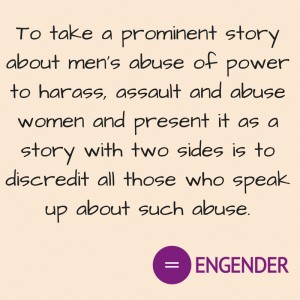Engender blog
Visibly Invisible: Meet the superhumans
-350.png)
Engender has been working with University of Stirling student Caroline Darke on a project exploring some of the issues around the representation (or rather, lack) of women with disabilities within the mainstream Scottish and UK media. This project connects with Engender’s on-going commitment to achieving gender parity within the Scottish media, and our Disabled Women: Our Bodies, Our Rights project, which examines the rights of disabled women and their reproductive journeys within current social care practices and government policy.
This is Caroline's fourth blog as part of this series. Read blogs one, two, and three here.
Visibly Invisible: We are not all the same
-350.png)
Engender has been working with University of Stirling student Caroline Darke on a project exploring some of the issues around the representation (or rather, lack) of women with disabilities within the mainstream Scottish and UK media. This project connects with Engender’s on-going commitment to achieving gender parity within the Scottish media, and our Disabled Women: Our Bodies, Our Rights project, which examines the rights of disabled women and their reproductive journeys within current social care practices and government policy.
This is Caroline's third blog as part of this series. Read blogs one and two here.
Visibly Invisible: Where are we at now?
-350.png)
Engender has been working with University of Stirling student Caroline Darke on a project exploring some of the issues around the representation (or rather, lack) of women with disabilities within the mainstream Scottish and UK media. This project connects with Engender’s on-going commitment to achieving gender parity within the Scottish media, and our Disabled Women: Our Bodies, Our Rights project, which examines the rights of disabled women and their reproductive journeys within current social care practices and government policy.
This is Caroline's second blog as part of this series. Read the first one here.
Visibly Invisible: Cultural representations of women with disabilites in contemporary scottish and uk media
 Engender has been working with University of Stirling student Caroline Darke on a project exploring some of the issues around the representation (or rather, lack) of women with disabilities within the mainstream Scottish and UK media. This project connects with Engender’s on-going commitment to achieving gender parity within the Scottish media, and our Disabled Women: Our Bodies, Our Rights project, which examines the rights of disabled women and their reproductive journeys within current social care practices and government policy.
Engender has been working with University of Stirling student Caroline Darke on a project exploring some of the issues around the representation (or rather, lack) of women with disabilities within the mainstream Scottish and UK media. This project connects with Engender’s on-going commitment to achieving gender parity within the Scottish media, and our Disabled Women: Our Bodies, Our Rights project, which examines the rights of disabled women and their reproductive journeys within current social care practices and government policy.
This blog is the first in a series Caroline will be writing for us, and explores some of the discourse surrounding disabled women in Scotland.
Why There Aren’t Always Two Sides to Every Story
Here at Engender we receive frequent requests to go on the radio, TV or in front of a live audience to ‘debate’ feminist issues.
To discuss whether the pay gap really exists, whether a video of shirtless men doing yoga is proof of ‘reverse sexism’ in Scotland, or whether it’s unfair that women are now allowed to play golf.

We tend to refuse these requests, and are subsequently charged with failure to represent feminist arguments, failure to take advantage of an opportunity to reach a wider listenership, or simply allowing sexist views to go unchallenged. We argue that to partake in a debate which shouldn’t ever be a debate in the first place is a far more dangerous failure.
Downloads
 Engender Briefing: Pension Credit Entitlement Changes
From 15 May 2019, new changes will be introduced which will require couples where one partner has reached state pension age and one has not (‘mixed age couples’) to claim universal credit (UC) instead of Pension Credit.
Engender Briefing: Pension Credit Entitlement Changes
From 15 May 2019, new changes will be introduced which will require couples where one partner has reached state pension age and one has not (‘mixed age couples’) to claim universal credit (UC) instead of Pension Credit.
 Engender Parliamentary Briefing: Condemnation of Misogyny, Racism, Harassment and Sexism
Engender welcomes this Scottish Parliament Debate on Condemnation of Misogyny, Racism, Harassment and Sexism and the opportunity to raise awareness of the ways in which women in Scotland’s inequality contributes to gender-based violence.
Engender Parliamentary Briefing: Condemnation of Misogyny, Racism, Harassment and Sexism
Engender welcomes this Scottish Parliament Debate on Condemnation of Misogyny, Racism, Harassment and Sexism and the opportunity to raise awareness of the ways in which women in Scotland’s inequality contributes to gender-based violence.
 Gender Matters in Social Security: Individual Payments of Universal Credit
A paper calling on the Scottish Government to automatically split payments of Universal Credit between couples, once this power is devolved to the Scottish Parliament.
Gender Matters in Social Security: Individual Payments of Universal Credit
A paper calling on the Scottish Government to automatically split payments of Universal Credit between couples, once this power is devolved to the Scottish Parliament.
 Gender Matters Manifesto: Twenty for 2016
This manifesto sets out measures that, with political will, can be taken over the next parliamentary term in pursuit of these goals.
Gender Matters Manifesto: Twenty for 2016
This manifesto sets out measures that, with political will, can be taken over the next parliamentary term in pursuit of these goals.
 Scottish NGO Briefing for UN Special Rapporteur on Violence Against Women
Joint briefing paper for the UN Rapporteur on Violence Against Women.
Scottish NGO Briefing for UN Special Rapporteur on Violence Against Women
Joint briefing paper for the UN Rapporteur on Violence Against Women.

Newsletter
Sign up to receive our newsletter here:
Sign up to our mailing list
Receive key feminist updates direct to your inbox: